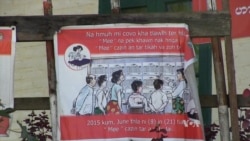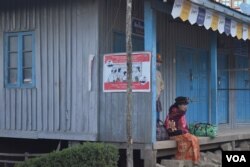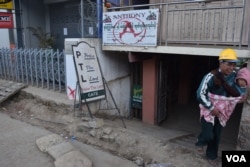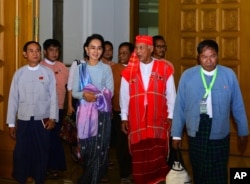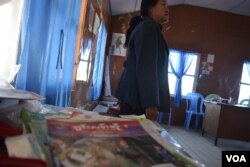The Chin National Democratic Party went into Myanmar’s November 8 election holding four seats in the national parliament, and with five representatives in the Chin State regional legislature. When a new government forms early next year, the party will hold no seats at all, having been wiped out by Aung San Suu Kyi’s party, the National League for Democracy.
Community leaders in Myanmar’s rugged and remote northwest had expected the overwhelmingly Christian ethnic Chin population of the state to elect local parties over the NLD, the leadership of which is dominated by the mostly Buddhist Burman majority.
The NLD’s nationwide campaign message, it is "time to change" the country after more than half a century of authoritarian rule, however, appears to have drowned out appeals to ethnic solidarity.
“It’s mainly the influence and the power of Aung San Suu Kyi,” reflected Siang Mang, a local community elder in the state capital, Hakha, who ran for election for the Chin National Democratic Party and lost to an NLD candidate.
Across the country, parties purporting to represent the interests of ethnic minorities are coming to terms with the NLD’s massive victory. The party took almost 80 percent of seats nationwide in the vote, widely hailed as the first credible election the country has held in decades.
Political awareness
Most ethnic Chin people had bought into a nationwide movement for change, Siang Mang conceded; but, he said this displayed a lack of “political awareness” among voters. In truth, he believes the NLD could not deliver the autonomy sought in ethnic minority areas like Chin state, where armed groups have fought sporadically with the central government for decades, he said.
“We respect Aung San Suu Kyi very much, but when it comes to ethnic issues and peace negotiations, she seems to stand aside,” Siang Mang told VOA News.
Despite these misgivings, voters largely backed Aung San Suu Kyi in most of Myanmar’s ethnic minority areas, with the exceptions of Shan and Rakhine states, where NLD-aligned ethnic parties performed well. The Zomi Congress for Democracy, which had some electoral successes in the northern part of Chin state, has a longstanding pact with the NLD.
Aung San Suu Kyi’s status as a national leader “is so strong that it may overcome ethnic division,” researcher Adam Burke has written in a paper for the Australian National University’s New Mandala Inquirer. “Her projected image of benevolent power, and her opposition to the military, raises her above all others. This image was carefully managed in the run-up to the election.”
Ethnic parties also suffered from a failure to unite in most ethnic regions. “The result was not only a split ethnic vote, leaving space for the NLD to prosper, but also limited public enthusiasm over local parties that appeared small and weak,” Burke wrote.
Voter confusion
In Chin state, 10 different parties representing local ethnic people contested seats, partly reflecting divisions among the various tribes residing in the state that each speak their own language. One of those parties, the Chin League for Democracy, was founded only last year as a breakaway from the Chin National Democratic Party, but fielded 29 candidates in the election, many of those running against at least one other Chin party member.
The party’s chairwoman in Hakha, Sui Sung, who failed to win a seat in the national parliament’s Upper House, admitted the confusing array of Chin parties may have helped the NLD. As well as having similar names, some of the Chin parties’ campaign literature used the same symbol, the hornbill, which is the state bird.
“There are many Chin parties, and as the Burmese proverb says, ‘If a herd of cows is divided, a tiger can prey on them’,” Sui Sung said. She added that she hoped the Chin parties would form a united front before the next nationwide polls, due in five years’ time.
Ethnic voters’ decision to back Aung San Suu Kyi may have been savvy in the national context: The NLD needed to gain a large majority in the national parliament even to form the next government.
Democracy
With Myanmar’s constitution guaranteeing the generals a prominent role in politics, the landslide victory over the ruling military-backed party may have given the country a decisive push toward a more democratic path.
“A lot of people said next time we are going to vote for our ethnic parties, but this time is for NLD,” said Chin artist and filmmaker Anna Biak Tha Mawi.
Chin voters hoped the NLD, despite being a national party, would still be able to represent the Chin people’s interests, she said.
“A lot of people who voted for NLD really hope that we are not wrong to support them,” she added, “but we will have to wait and see what will happen.”




